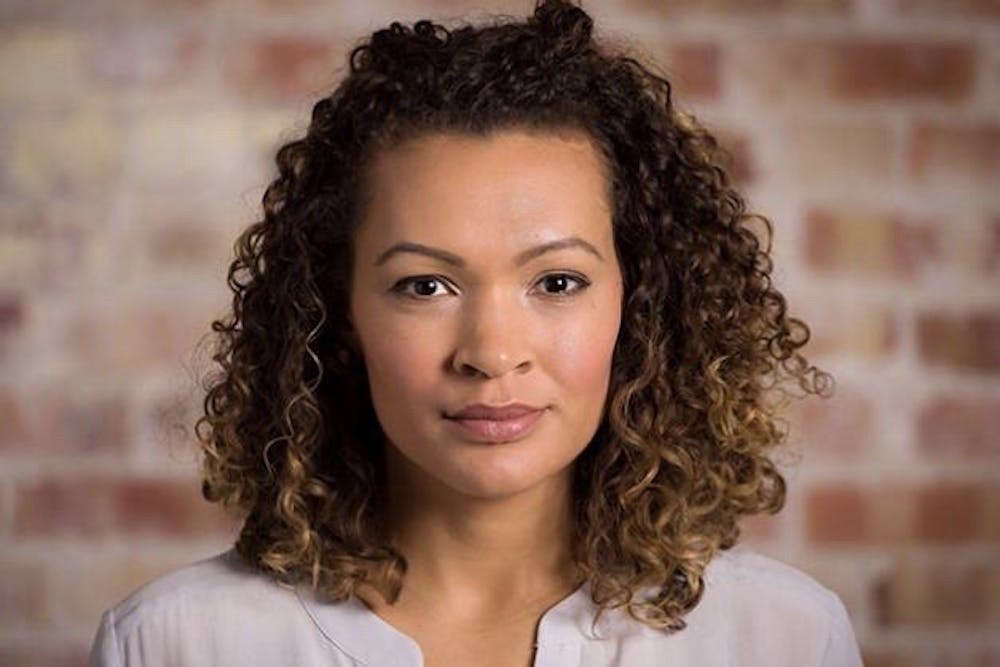
Annenberg School for Communication professor Sarah J. Jackson is interested in how marginalized groups of people "create and tell stories and make political change."
Annenberg professor Sarah J. Jackson, an authority on Black and feminist activism and social movements, will lead Annenberg's Media, Inequality, and Change Center as co-director, the MIC Center announced.
The Media, Inequality, and Change Center is a joint venture between Penn's Annenberg School and Rutgers University's School of Communication and Information that studies "the political economy of social problems, media, and democracy." Its core mission is “addressing structural inequality in all its forms.”
Jackson will lead the MIC Center with co-directors and founders Victor Pickard, Professor of Communication at Annenberg, and Todd Wolfson, Professor of Journalism and Media at the Rutgers School of Communication and Information. In her new role, Jackson plans on studying how Black activism is communicated through media and politics, including the Black Lives Matter movement.
“I'm really interested in studying the way that voices that historically and contemporarily have been on the margins, or have been ignored in mainstream politics or mainstream media, create and tell stories and make political change,” Jackson said.
Jackson said the influential grassroots activism of the Black Lives Matter movement is a source of motivation for her. One of Jackson’s first endeavors with the MIC Center will examine news coverage of this summer’s BLM protests and how concepts like defunding the police were introduced to the public sphere.
She is also in the process of organizing a symposium scheduled for Dec. 4, called Black Media-Makers in the Fierce Urgency of Now. The day-long event will feature Black journalists and filmmakers, several of whom Jackson is also interviewing for her a book she is writing, who will discuss their work in this current political moment.
Jackson explored marginalized voices in mainstream media in her two books: first in Black Celebrity, Racial Politics, and the Press by examining the relationship between Black celebrity activists and journalists, and later in Hashtag Activism: Networks of Race and Gender Justice, by studying the way Twitter hashtags have allowed ordinary people to embrace activism and create change.
In May, Jackson was awarded the 2020 Andrew Carnegie Fellowship, which funds research in the social sciences. She is using her fellowship to write her third book, which will focus on the role that Black media-makers play in shaping racial discourse in contemporary America, and how creators like Ava DuVernay, director of "13th" and "Selma", and Nikole Hannah-Jones, creator of the 1619 Project, successfully bridge the gap between Black politics and stories and the mainstream media.
“Black media-makers have always been at the forefront of democratic progress in the United States,” Jackson said. “They've always been at the forefront telling stories, asking questions, pushing buttons, and pushing issues that are really central to the nation's identity.”
The MIC Center's work in the Philadelphia community and its commitment to achieving social justice in communication and media strongly aligns with Jackson’s personal values and research priorities.
“The MIC Center is not just a research center, it’s an activist center,” Pickard said. “And I think that in both our research and our activist aims, Sarah Jackson's work will prove to be invaluable over the coming years.”
One MIC Center project, Philadelphia’s Media Ecosystem, aims to identify media structures and models that can address community issues and foster social change in the city. Pickard emphasized that this activism and community engagement are crucial to the mission of the Center.
“University centers, frankly, don't always collaborate with communities,” Jackson said. “I was really attracted to working with the folks at MIC because they have made one of their priorities ensuring that we're not just doing research that's for other scholars or academics, or for the University, but we're doing work and applied projects that really benefit our community partners.”
A virtual roundtable event on October 16 will outline the ways Jackson’s work will integrate into the MIC Center and discuss their goals for this academic year.
“I think the events of this year really show that this is a crucial and important issue and that we need to be thinking and talking about the experiences of Black Americans and listening to those stories,” Jackson said.
The Daily Pennsylvanian is an independent, student-run newspaper. Please consider making a donation to support the coverage that shapes the University. Your generosity ensures a future of strong journalism at Penn.
Donate







